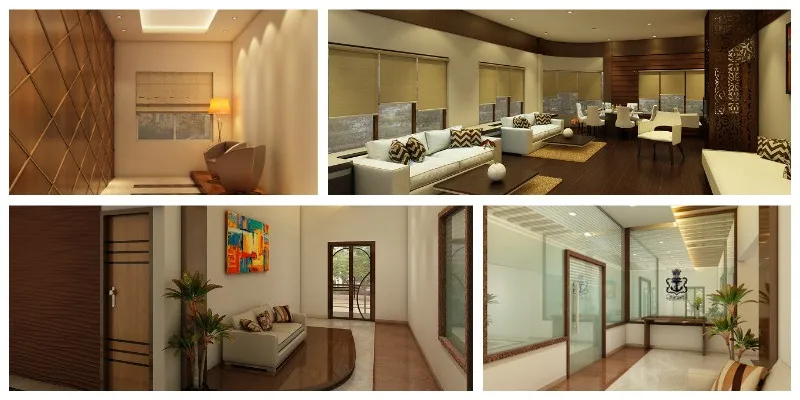Did you know this woman entrepreneur who designed interiors of Indian Navy ships like missile destroyer INS Mysore and aircraft carrier INS Vikramaditya
Lavina Rodrigues started Pyra Build & Design in August 2009 with the intention of dabbling in her passion for interior design. Today, the Navi Mumbai-based Pyra has grown into a turnkey interiors solutions provider with a turnover of Rs 5 crore. Lavina had initially started with a team of just three members, designing and executing several art works and murals for residential spaces and corporate houses. Today, Pyra specialises in providing end-to-end corporate infrastructure solutions for corporate, retail, hospitality and most interestingly, ship habitability spaces.
The struggler phase
After Lavina designed her own home, her neighbours and friends, who were impressed by her style, suggested projects for her to take up. It was this word of mouth publicity that set her on her entrepreneurial journey. She pursued a two-year part-time course at LS Raheja College to bring in professionalism to her innate style.
To cater to a client like the Indian Navy, a business with credibility and proven track record is expected, which a new firm like Pyra did not have. So initially, Lavina bid for and won smaller contracts to modify and upgrade the interiors of naval ships. The big challenge was the design which would be constrained by the limited space inside a naval ship. “We worked with the limitations and were able to provide excellent work. Also Pyra quickly developed a reputation for exceptional customer service and was able to build lasting relationships with clients and suppliers alike,” says 46-year-old Lavina.

Bootstrapped and loving it
During the initial months, there was always a cash crunch, as the Indian Navy works on a credit system and the payment is done only after the completion of the project. During this critical period, Lavina faced a lot of struggle to keep hanging on. She says, “You realise who your actual friends are and those who are with you only during the good times. Some friends pooled in funds to get me started and there were people who kept promising to help and let me fend for myself when push came to shove. But my learning from such experiences has been that tough times don’t last, tough people do!”
Growth by leaps and bounds
During their first year of business, Pyra saw a turnover of Rs 17 lakh. By 2011, the team had gained some expertise and bigger projects, and were able to do business of over Rs 50 lakh.
Pyra currently has a team of 15 members, and claim to chart an annual growth of 30‑35 percent. So far, the company has completed interiors for over 10 naval ships, including the INS Godavari, INS Akshay and INS Talwar among others, and a dozen naval units. Pyra has also worked with many civil clients including Tata Memorial Hospital, Future Group Retail, several builders and dozens of residential spaces.
Back in 2011, when President Pratibha Patil came for Presidential Fleet Review, Lavina was asked to design the Gold Room at the Mumbai command mess. Earlier this year, when Prime Minister Narendra Modi visited Mumbai, again Lavina had the privilege of being asked to give a total makeover to the VIP Room and Outer Entrance Area of INS Shikra for the occasion.

Strategy and plans
Lavina feels that understanding customer psyche is the most crucial requirement for any startup. “With desired deliverables, control on cost, and deadline-bound commitments, Pyra managed to establish its credentials quickly and differentiate from legacy-led businesses,” says Lavina.
Till date, technology isn’t a big part of the interiors business, but the Pyra team is developing complementary tech capabilities to offer a full-stack platform (from design to execution) for all interior needs.
Lavina also hopes to start her own bespoke furniture line. Currently, she is at the design stage and plans to sell the brand online. A factory space has been identified and production will be starting soon.
The entrepreneurship mantra

A single mom with two young sons, Lavina says, “I am blessed to have very understanding and responsible children. They are also very independent. When it comes to work-life balance, I do take each day as it comes and spend quality time with them whenever possible. Believing in oneself and valuing one’s business fundamentals is the only way to embark on your entrepreneurial journey.”
Women entrepreneurs do have it tough initially to prove they mean business, feels Lavina, but in the long run the journey is tough irrespective of gender. Though Lavina has worked with a client like the navy, which is still mostly a male bastion, she did not face any issues because of it. “Naval ships don’t even have a women’s restroom,” she says, “but the Naval officers are so respectful, they salute women even if they are civilians.”
Her advice to entrepreneurs would be
- Don’t be swayed by overnight success stories. Most entrepreneurs make it after years of hard work.
- Tough times don’t last, tough people do! Face adversity with confidence and know this too shall pass.
- Learn something from everyone you meet. Each and every person you meet, irrespective of their education and the work they do, has something to teach you.







